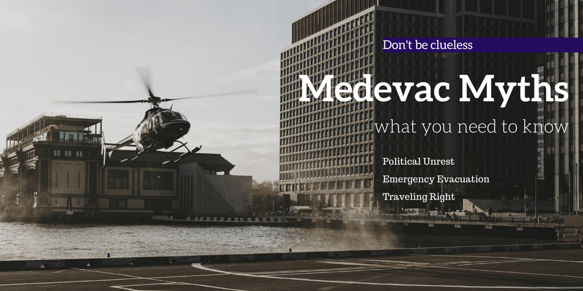Medevac is a hot topic lately. Travelers are becoming more aware of the need to have medevac coverage while traveling both domestic and international, but there is still a lot of confusion around the topic. Recently, USA Today published an article on the 5 Myths of Medical Evacuations. While they addressed these 5 myths appropriately, there are still some details in need of attention.

 1. Medical evacuation is just another name for travel insurance
1. Medical evacuation is just another name for travel insurance
"Travel insurance and medical evacuation services are anything but synonyms," says Dan Richards, CEO and founder of Global Rescue."Travel insurance protects travelers from financial loss resulting from canceled trips, lost luggage, medical expenses and some medical evacuation expenses.
Medical evacuation is a service used to deliver a traveler to life-saving care that may not be available at the traveler's location." Medical evacuation coverage is actually not insurance at all. It's a "membership," not a "policy," and sold separately by a handful of companies like Global Rescue and MedjetAssist.
While it is true that travel insurance and medical evacuation are separate entities, it is untrue that they do not work in conjunction with one another. There are some travel insurance companies, such as TravelSafe Insurance, whose plans include services with On Call International and coverage for the cost of evacuation.
On Call International is a service you, or the physician handling your treatment, can call to make medevac arrangements.
“This is perhaps the most important benefit we carry,” says Scott Perfetto, President of TravelSafe. “Trip cancellation is often in the spotlight, and with good reason but if you have to cancel your $2,000 vacation you may just have to miss out on your second vacation for that year, or cut your budget to make up for the loss. If you have to pay $60,000 for a medical evacuation, there is no recovering from that.”
The services you receive with On Call are so inclusive you are not only able to call for medevac, you are eligible for non-medical emergency evacuation.
“Our combined efforts with On Call International have allowed us to bring many travelers to safety in dire situations like Haiti, Egypt and now Nepal. Political unrest and natural disaster are both reasons to evacuate an area, and we don’t require a membership, it’s included with our policies. We believed travelers needed coverage from one place, for all possibilities.
We want to make sure you can take your next trip, because we love the travel industry and believe travel is good for everyone. We also want to keep the experience as positive as possible and help you in managing your risks. So we will handle your medical, lost baggage, trip interruption and evacuation because you deserve to have it all in one place.”
The coverage doesn't stop there. They also have primary medical for medical expenses incurred, trip interruption benefits to compensate for any prepaid expenses they are losing due to their emergency. Often times travelers are looking for value, and the best value is to look into coverage that addresses all of the possibilities.
2. I don't need medical evacuation coverage because I have a good health insurance policy
Health insurance never provides evacuation benefits. However, medical evacuation coverage does not solve all of the issues health insurance can. Medical evacuation cannot cover medical costs and deductible from your medical insurance company. It also cannot provide with trip interruption, which can assist you in reimbursement for prepaid expenses you will not get to partake in due to illness or injury.
3. My credit card already offers that kind of coverage
"Some credit cards do offer nearest appropriate medical coverage," says Richards, "but they leave it up to you to arrange all the details yourself and outsource to third parties all critical elements."
This is spot on. Not only is the medical coverage usually offered to the "nearest appropriate facility," it is also left up to you to make the arrangements. If you carry a plan that offers primary medical, emergency evacuation and 24 hour emergency assistance, you are able to have assistance and coverage in the most important, and usually most expensive, areas.
4. I only travel in the United States, so why would I need medical evacuation coverage?
So many travelers make this argument. There are several scenarios which resulted in emergency evacuation, the most recent were the shark attacks seen in South Carolina. There are plenty of health insurance providers that would not pay for emergency evacuation, or they would have a cap as to how much it could cost.
5. These kinds of policies are too expensive and travel is expensive enough
This seems to be a consistent trend across the board. Travelers have yet to see the need for emergency assistance, but that is because most travelers suffer from optimism bias. Purchasing a product to ensure you are covering expenses you really can't afford is being smart with your money. Chances are, if you can afford a $3,000 vacation, you can afford a policy for a fraction of the cost. What you probably can't afford are evacuation expenses that typically range between $25,000-$250,000.
These were five very good points regarding medical evacuation, but your coverage should not just stop with evacuation. Your coverage should address all possibilities that could negatively impact your travel investment. No, you don't want a medical evacuation bill of 75K, but you don't want to be left without assistance during other emergency situations as well.